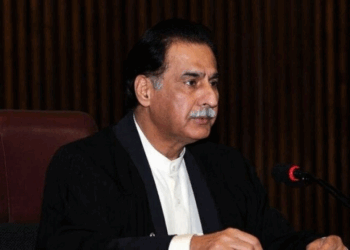By Hafiz Ehsan Ahmed
The legislative power of Parliament is essential to its ability to serve the country and public interest. Legislative competence is usually addressed in the constitution of a country. Social welfare, criminal law, economic regulation, public policy, and taxes are examples of subjects that fall under the purview of legislative competence. However, such modifications frequently need adherence to procedural restrictions and constitutional limitations.
Simultaneously, constitutional provisions that confer judicial review over legislative competency upon courts globally, including Pakistan’s supreme or constitutional courts, recognize a legal basis and confer authority upon them. The ability of the judiciary to carefully examine the legality and constitutionality of laws passed by the legislature is meant by this. This method ensures that the legislature respects core constitutional principles, refrains from misusing its authority, and remains within its established boundaries. If it is found that a statute or legislative action goes beyond the authority of the legislature, it may be declared void and unconstitutional.
Simultaneously, one important aspect of the judiciary’s responsibility in upholding constitutional supremacy and defending citizens’ rights in Pakistan is its ability to evaluate legislation.
The federal and provincial legislatures’ laws and amendments can be examined by the Supreme Court, in particular, to make sure they stay within constitutional bounds, respect fundamental rights, and don’t go beyond the scope of their authority. The Supreme Court reaffirmed its authority to review any action, including legislative measures, for their constitutionality in several cases, including Federation of Pakistan v. Aitzaz Ahsan (1989), Wukala Mahaz Barai Tahafuz Dastoor v. Federation of Pakistan (1998), and Zafar Ali Shah v. Pervez Musharraf (2000). The judiciary can also overturn any law that falls outside the purview of the Parliament or provincial assemblies. However, there is a presumption that laws passed by Parliament are constitutional, so courts generally uphold the validity of laws unless there is clear and compelling evidence to show that they violate the Constitution or go beyond the authority of Parliament. As a result, there are established legal interpretation principles that the courts are required to consider when exercising such powers.
The 6th September 2024 judgment passed unanimously by the five members of the Supreme Court under section 5 of the Practice and Procedure Act 2023 regarding the validity of the impugned judgment and around 44 NAB impugned amendments introduced by the Parliament in 2022 not only overturns the previous judgment of Supreme Court, September 15, 2023 but also provided significant constitutional observations and findings even on invoking its constitutional jurisdiction Article 184(3) of the Constitution which would have major affect for future decisions of the Supreme Court.
There is no legal doubt that legislation cannot be treated equally to executive action or inaction and that in deciding cases, the courts must show how the amendments violated or infringed upon any of the Fundamental Rights. Whenever possible, the legislation should be upheld rather than being quickly struck down, and if there are two or more interpretations of any given law, the interpretation that favours the law should be adopted. However, on September 15, 2023, the Supreme Court passed the contested judgment, and it was not even necessary to apply the test that the contested amendments must pass based on the Constitution and that too has been observed by the Supreme Court in the 6th September judgment.
The primary function of the legislature, which is one of the many bodies established under the Constitution, is to enact laws. Until a law or any provision of a law is successfully challenged and overturned by a High Court or by the Supreme Court, it is deemed to have been validly enacted and must be obeyed. This means that legislation passed by Parliament should not be suspended through interim orders of courts and this was not taken into consideration when the court passed the contested judgment on September 15, 2023.
The Constitution of Pakistan has set out the respective roles of the Legislature and of the Judiciary and every care should be taken to ensure that neither encroaches into the domain of the other and that the Chief Justice and the Judges of the Supreme Court are not the gatekeepers of Parliament thus abiding and following the law would also have saved considerable time of this Court and public resources as well as rightly held so in the 6th September judgment. It is a well-established legal principle that amendments, or any of its provisions, cannot be declared invalid by courts ordinarily unless they explicitly state or show that they violate the Fundamental Rights outlined in the Constitution or lack legislative authority. This principle was also not taken into account in a previous Supreme Court decision. The judiciary, like Parliament, must respect its constitutional bounds and refrain from taking on roles that are contrary to the letter and spirit of the Constitution. This is also crucial from a legal and constitutional standpoint.
There is no denying that the current Supreme Court decision and the amendments passed by the Parliament in 2022 and 202023 have a sordid past. In particular, the NAB has repeatedly warned the Parliament and Superior courts in stern terms while failing to maintain its impartiality and to carry out its legal duties independently as required by law. But at the same time, no nation can advance and uphold the rule of law unless it has a robust, impartial, efficient, and prompt accountability framework—as many other nations do.
Therefore, it is consequently essential to immediately establish a robust, strong, impartial, transparent, effective, and trustworthy accountable system in Pakistan. This can be achieved by dismantling the provincial anti-corruption agencies as well as the current NAB institution as soon as possible. It is crucial to do this while enacting relevant legislation that is based on state-of-the-art methods for international best practices in investigation, prosecution, and law enforcement. Additionally, all white-collar crimes should be cognizable under less than one legal roof, as is the case with the UK’s NCA and many other nations.








